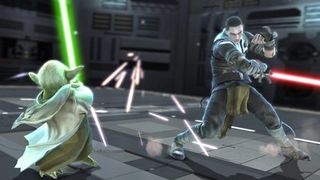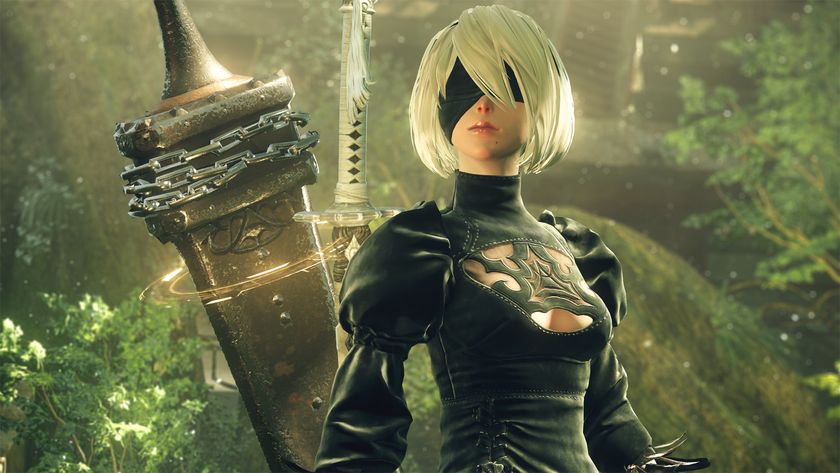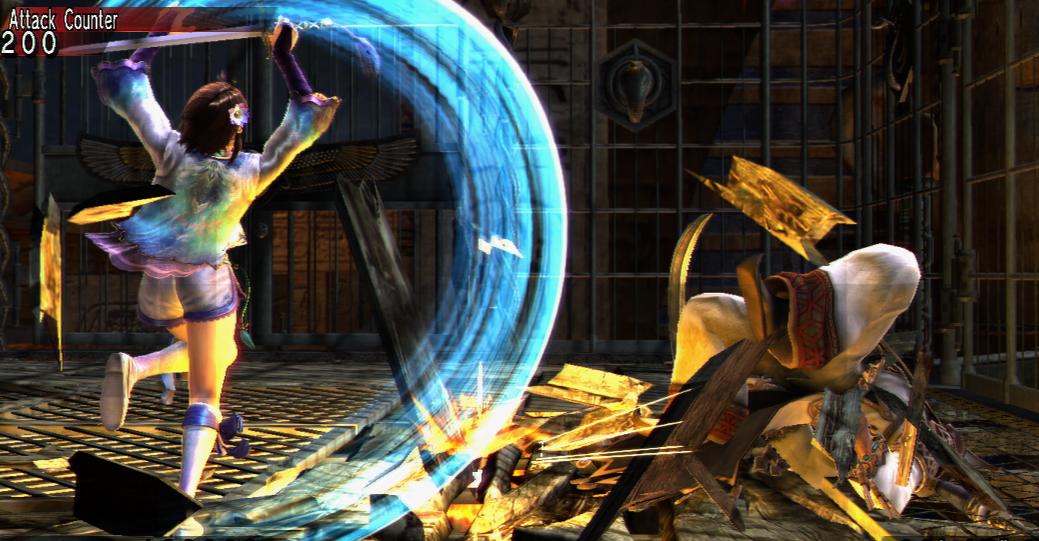GamesRadar+ Verdict
Pros
- +
The meatiest impacts in games
- +
Outfits bordering on the illegal
- +
Beautifully balanced fighting
Cons
- -
Slightly disappointing roster
- -
No creation-based fighting styles
- -
Star Wars fighters out of place
Why you can trust GamesRadar+
Bashing exotic opponents with gigantic fantasy swords is brilliant. That’s the fundamental thing that sets Soulcalibur apart from other fighting games. Sensibly ditching the logic that says that being hit with a giant, medieval zweihander would cut you in half, its effect is downgraded to just driving you into the floor or knocking you into the sky. You can swipe people with a katana, prod them with a rapier, poke them with a pole or play a nunchaku drum solo on their rib cage. And best of all, you can smash their trousers with a hammer and make them fight in their underwear.

We’ll get to the stripping in a minute. First, what you need to know is that Soulcalibur’s always been an offence-based game, based more on movement and relentless hitting than blocking. This makes it a much easier game to bluff your way through than Tekken or Virtua Fighter: pick a mega-hard fighter like Nightmare or Astaroth and run through their combos until you find the easiest, most damaging one possible, and you can abuse it shamelessly until people learn to block it. Start to fight people good enough to do more than just mash the buttons, however, and you’ll need to learn that the main attack buttons are divided into horizontal and vertical attacks. If you can read what your opponent is going to do and duck or sidestep accordingly, you’re at a massive advantage.
Alternatively, if you’ve got the timing down, you can perform a parry, knocking your opponent back and leaving them wide open. To make normal blocking even less appealing, though, there’s a new element to the combat: critical hits. Now repetitive hits to the same area will deplete the new Soul Gauge, turning it from blue to red. This is where the stripping comes in, because enough hits will shatter the armour on an opponent’s head, body or legs – usually leaving them bare-chested or hatless – increasing the damage they’ll take in that area. And if you hit all four attack buttons during the split-second this happens, you’ll go into a preset Critical Finish combo for an instant kill. It sounds game-breaking, but in reality the timing is so tricky to master you’ll only pull it off if the other player’s not fighting back. As such it’s just a way of punishing defensive players. Oh, and letting you see their underwear.
Obviously it sounds a bit weird to go on about how well-designed everyone’s undies are but that’s obviously the sort of thing game designer Katsutoshi Satashi pays attention to, so we’re being respectful, not pervy. Knock Maxi’s waistcoat off, and you’re rewarded with a chest that shines like dew in the morning sun. Mitsurugi’s hair looks strokably soft, Voldo’s codpiece is terrifyingly detailed and Ivy’s entire wardrobe is ridiculous. The saucy corset-panty ensembles are thrown into sharp relief by the lovely environments, best of which are the exteriors. You might be too busy but spectators can marvel at the dodos, lizardmen and carousel puppets. Each background has its own ring-out areas and smashable bits, and each subtly changes the way you tackle fights. This is handy, because in terms of new fighters, this edition is slightly disappointing. The creation-based fighting styles have been completely ditched, probably because they were too unbalanced.
So if you make a new character they’re just a carbon copy of an existing fighter’s move set with sexier hair. Amy – Raphael’s adopted daughter – returns with her own fighting style, rather than the ‘Rapier’ class from the last game. Cassandra gets a move set that’s slightly more distinct from her sister’s than the one seen in Soul Calibur III. The only ‘proper’ new character is Teutonic blitzfrau Hilde, who mixes up pokey, Kilik-inspired pike attacks with a variety of shortsword moves in a style so frustrating it’s like being held at arm’s length by a basketball player while he kicks you in the nuts. Also new is boss Algol, who fights bare-handed but fires balls of energy and generates massive swords from his gnarled fists. He’s a bit like Nightmare – who’s already a lot like Siegfried – and so rarely gets picked in our lunchtime winner-stays-on sessions.
More info
| Genre | Fighting |
| Description | Sure, the Star Wars characters don't really belong here, but nonsense is the order of the day in Soulcalibur IV, and the game's better for it. New fighting mechanics, and a finely balanced roster round out the hugely satisfying package here. Forget the Virtua Fighter purists. This is the new king of fighters. |
| Platform | "PS3","Xbox 360" |
| US censor rating | "Teen","Teen" |
| UK censor rating | "16+","16+" |
| Alternative names | "Soul Calibur IV","Soul Calibur 4","Soulcalibur 4","SCIV" |
| Release date | 1 January 1970 (US), 1 January 1970 (UK) |

Square Enix announces event for the Nier series' 15th anniversary, and fans are hoping Nier Automata will finally get a sequel after 7 years

While I'm hyped for GTA 6, my biggest fear is that it's already dated itself

PUBG creator's goal for his new open-world project is to make "realistic Minecraft" complete with real geology
Most Popular





